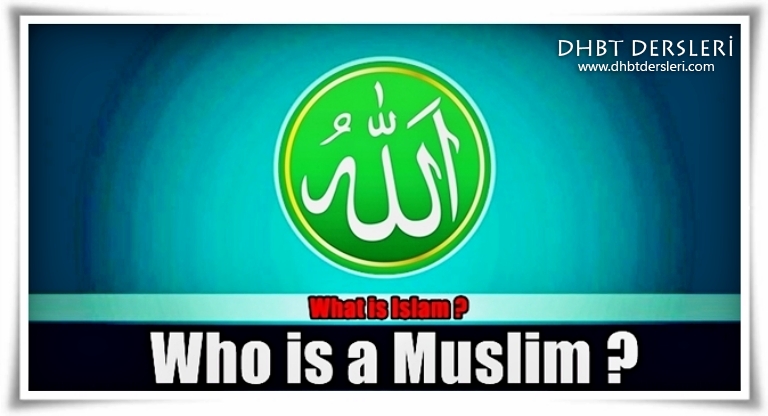The Arabic word “islâm” is derived from a word, which is also used to derive words “silm” (“peace”), “voluntary self-surrendering” (“taslimiyah”), and “salamah” (“salvation”).
What is Islam and who is a Muslim ?
A “Muslim,” therefore, is “one who fully embraces the way of life Islam shows, by unconditionally surrendering to the will of Allah.” Also, using these three terms, one could state the following: “Islam is a way of voluntarily surrendering (taslimiyah) for the sake of peace (silm) on Earth and eternal salvation (salamah) in the Hereafter.”
Islam is, as these very term implies, “peace”; a Muslim, on the other hand, is someone who lives in peace and promotes others to live in peace a volunteer for peace, in short.Islam is a way for those who submit themselves to truth and not subdue truth to their whims.
Islam is a generic term for all the values humans cherish since the inception of humankind: The only true religion in the sight of Allah (‘Ali`Imran 3:19) and self-surrendering is what Allah wills as the religion for humans (Ma’idah 5:3). Further, Islam is the name of a perfect system that unifies morals, faith, worship and values in humans’ life (Baqarah 2:208).
Islam promotes the notion of the Creator as the center of humans’ consciousness. Therefore, Islam confirms that the Creator granted reason, mind, will and conscience to humans. Islam is the way of those who recognize humans’ freewill to choose between the good and the bad.
Islam is not just a religion among other religions, but it is a collection of those values, which were promoted as a way of life by all the prophets and messengers of Allah (Haj 22:78). In its broadest meaning, Islam is the name of the system Allah rules the universe with (Fussilat 41:11).
If “cosmos” rules over universe, not “chaos,” then it is an indication of a majestic balance and a system in this very universe. Speking of “cosmos” and “system,” one cannot but mention “harmony.” Hence, the harmony among all beings in the universe is their submission to Allah’s will (Rahman 55:6).
Muslim is one who willingly and conscientiously submits himself/herself to Allah for the sake of peace and harmony in both inner and outer worlds. Muslim is one who believes in the Lord of the worlds and fulfills His orders without hesitation or questioning. Muslim is one who prefers “Allah’s will” to “my ego’s will.” Muslim is one who found his true self.
Muslim is any one who willingly and unquestioningly surrenders to Allah’s will—the way of life Islam teaches. Allah says in the Qur’an that those who sincerely believe in Him and unconditionally fulfill His commands are “muslimoon” (submitters) (Haj 22:78). One’s surrendering to Allah’s will is not his/her grace toward Allah, but it is Allah’s grace that one attains faith in Him (Hujurat 49:17).
What Islam is not?
Islam cannot be decreased to the level of a simple belief: Islam offers regulations and rules for both believing and living at the same time. After all, Islam has an answer to any and all aspects of humans’ life. As mentioned above, Islam promotes the notion of the Creator as the center of humans’ conscience.
In other words, Islam is a worldview that focuses on the Only Creator and implementing His commands. Islam confirms that the Creator granted humans reason, mind, will, and conscience, and that it is the way of those who recognize humans’ freewill to choose between the good and the bad. These peculiarities warrant Islam’s capacity to govern humans’ faiths and lives. That said, Islam includes not only basics of faith, but also of action. Thus, Islam promotes the beauty of both faith and action (Layl 92:5-7).
Islam cannot be limited to conscience alone:
One’s consciousness is the house of Allah. The Creator speaks to humans through their consciousness, while Islam speaks to humans’ consciousness. Thus, unless Islam is embedded in one’s soul, it is equal to a seed without soil. However, Islam cannot be limited to consciousness alone, for doing so would be tantamount to imprisoning Islam in it. On the contrary, Islam sets one’s consciousness, reason, mind, and will in motion. Islam demands the human to become active and increase good deeds. Just like the Qur’an addressed the Prophet Muhammad in the beginning of his mission: “O thou [in thy solitude] enfolded! Arise and warn!” (Muddaththir 74:1-2)
Islam cannot be limited to an ideology:
Islam exercises a particular kind of ideology it generates. However, Islam is in no way limited to that ideology. Ideologies are secular notions. Islam, on the other hand, classifies becoming worldly as “alienating from the natural human disposition.” Ideologies offer no eschatology (the Hereafter), while Islam looks beyond this temporal life and shows a way of life for humans for reaching eternal bliss in the Hereafter.
Islam cannot be limited to politics:
Islam generates Islamic politics, which rest on five pillars:
- Truth/monotheism
- Justice
- Compassion
- Competence
- Counseling.
At the same time, limiting Islam to politics would be injustice towards its all-encompassing capacity. Politics aim at generating benefits and interests for politicians, whereas Islam aims at global goodness and benevolence. Politics focus on the outcome, while Islam focuses on efforts to reach an outcome. Politics aim at a triumph in this world, while Islam guides one throughout a journey to reach triumph in the eternal next world.
Is it true that Islam did not begin with Prophet Muhammad ?
Prophet Mohammad did not found Islam. According to the Qur’an, Islam existed since the inception of humanity (see the Qur’an Haj 22:78). Allah is One and the humans are one in their kind; hence, there is only “one” mission/task/revelation/ instruction Allah descended upon humans. Therefore, as prophets from the first to the last preached, the only valid religion Allah accepts is Islam (Ma’idah 5:3).
Save certain modifications in worship and differences on permissible/non-permissible based on societies’ peculiarities and circumstances, the foundations of faith have always been the same throughout the history of humankind. The prophets Noah, Abraham, Moses, Jesus and all other prophets are named Muslims in the Qur’an. There is a consistent set of core values common to all humankind, and Islam is the religion that encompasses them. None of the prophets of Allah questioned His commands; on the contrary, they fully submitted themselves to His will and fulfilled His orders. Thus, Islam is the religion that Allah perfected and bestowed on humanity as a blessing, and Allah has willed self-surrender unto Him as humanity’s religion.
How does one become a Muslim ?
There is no authority, church, institution or clergy to accept one into Islam on behalf of Allah. Entering Islam is a covenant between Allah and said individual, which takes place without a mediator. Choosing the way of freely self surrendering is sufficient for one to become a Muslim. Joining the ranks of Muslims occurs by uttering the following two statements by tongue and confirming them with heart: “Ashhadu an la ilaha illa Allahu wa ashadu anna Muhammadan abduhu wa rasuluh” — “I bear witness that there is none worthy of worship but Allah and I bear witness that Muhammad is His servant and messenger.” The testimony is obviously a fundamental notion in Islam. Allah Himself confirms His solitude as the only deity worthy of worshipping (‘Ali`Imran 3:18). On top of that, Allah wills that humans also testify to His oneness. The goal here is dignifying humans and showing them His mercy by making them closer through their testimony of His oneness. The first statement attests to a faith in the existence, oneness and uniqueness of the absolute and eternal Creator, who has no resemblance in created beings.
The second statement attests to a faith that all messengers, including Prophet Muhammad, received revelations directly from Allah and that they were human beings. For someone entering Islam by making these statements, there are two sources for guidance on how to live his/her further life: 1) The dynamic text of the Qur’an, which forms the theoretical framework for life, and 2) The practical examples of Prophet Muhammad who was a “walking example” of living by the Qur’an. To be sure, there is no “entering Islam” component in a practice where one proclaims accepting Islam in front of a community of Muslims; the goal pursued here is notifying other Muslims of his/ her decision.

































